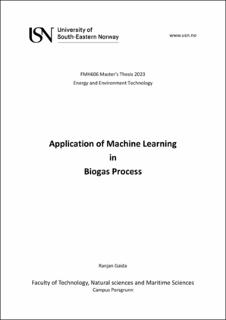| dc.description.abstract | Anaerobic digestion has become increasingly popular due to its potential to recover value-added resources from organic waste. To overcome the challenges of complex and non-linear relationships between the micro-organisms, machine learning-based approaches can be used for prediction, fault detection, optimization, and management of the overall process. Literature review suggested scoping review as the most effective method for understanding the topic. Search strings were developed on Scopus, Web of Science and Google scholar website to find research papers relevant to the thesis work, and 30 articles were selected. Limiting of research papers was followed by screening and trimming duplicate lists. Artificial Neural Network (ANN), Random Forest (RF) and K-Nearest Neighbor (KNN) were found to be best suitable method. Python code was written for ANN, RF and KNN, and data was analysed using packages like numpy, pandas, matplotlib and scikit-learn. Input variables such as influent sludge flow rate, total solids content, volatile solids content, alkalinity and volatile fatty acids were considered, and biogas production was the output variable. The prediction of the model's accuracy was done using two parameters, determination coefficient (R2) and mean squared error (MSE). R2 values for ANN, RF, KNN were found to be 59.3%, 62% and 51.5%, respectively, while MSE values were 6032492.244, 6695312.177 and 6854866.264. The best condition for R2 is given by RF method, while MSE values favours ANN method. Literature review suggested R2 gives the most accurate prediction as compared to other methods and hence RF method was considered to be the most suitable method for prediction of biogas. | |
